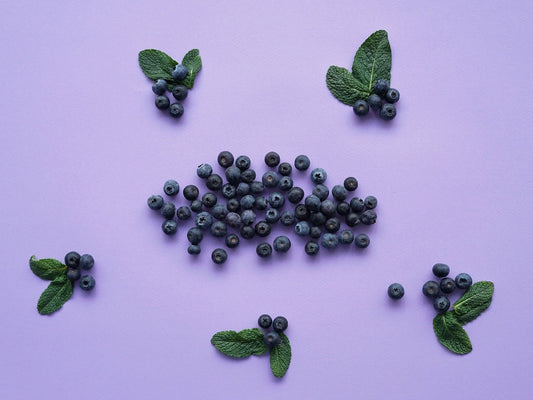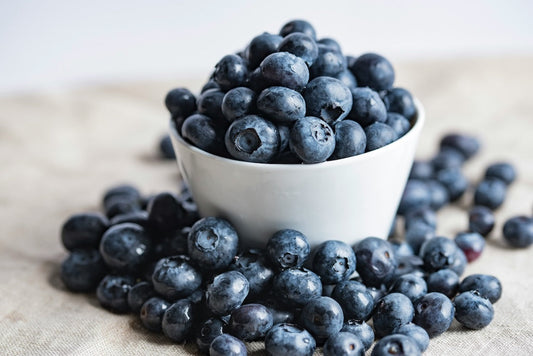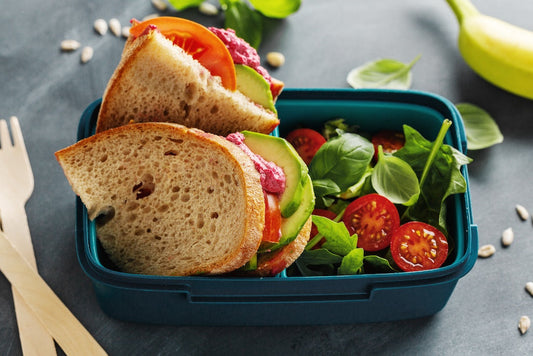Protein is one of the three macronutrients, along with carbohydrates and fats.
A high-protein diet helps you to build muscle, lose weight and is very healthy. In today's blog post, we will explain how you can meet your daily protein requirement with a balanced diet, which plant-based and animal protein sources are available and what health benefits await you with a high-protein diet.
Discover Verival Protein Breakfast
What is a high-protein diet?
The question of what constitutes a high-protein diet is often not that easy to answer. What exactly is a high-protein diet? Just eat a lot of eggs? It's not that simple either.
A healthy high-protein diet means that you get the majority of your daily calories from protein. However, there is no real exact definition of this, as exact numbers vary from person to person.
Exactly how much protein you need for a high-protein diet to work depends on your lifestyle and your goals. It makes a difference if you do a lot of sports or have a physically demanding job.
The German Nutrition Society (DGE) recommends a minimum daily intake of 0.8 grams per kilo of body weight. For competitive athletes, it may also be 1-1.2 grams per kilo of body weight.
There are many sources of protein. The prejudice about a high-protein diet is well known: that animal products provide the most protein. But this is only partially true. You can also get more than enough protein with a vegetarian or even a vegan diet.
By the way, you shouldn't consume too much protein. Your kidneys still have to process it and you gain body fat very quickly and your digestion is put under strain. So our Verival recommendation: no more protein than necessary!
Proteins are found in many animal and plant-based foods.
What are the effects of a high-protein diet?
What actually happens when you add a lot of protein to your diet? What positive effects does it have on the body?
A balanced diet consists of many different substances and foods. Proteins, carbohydrates, minerals, amino acids and healthy fats – all these substances are very important for a balanced diet.
A high-protein diet also helps you build muscle! It is important for athletes to consume enough protein, because protein is essential for building muscle mass.
Losing weight with a high-protein diet
Everyone will be familiar with the term low-carb diet. These refer to diets that contain few carbohydrates but a lot of protein, and are supposed to help you lose weight quickly.
In theory, it works like this: taking protein boosts fat burning and speeds up the metabolism. This works particularly well in combination with exercise. With a high-protein diet and avoiding carbohydrates, you force your body to break down excess fat. Ergo: You lose weight!
Another advantage of a low-carb diet is that your blood sugar level is kept at a constant level by the proteins, which in turn prevents ravenous attacks!
It is important to make sure that you do not consume much more than 0.8 grams of protein per kilogram of body weight in a high-protein diet. This will cause you to gain body fat rather than lose it.
High-protein nutrition and sports
Sports and proteins are so closely linked that it would be very disadvantageous to separate the two. If you do sports and want to build muscle, there is no way around integrating proteins into your diet.
Proteins are important for athletes in many ways. Protein is the best friend when building muscle and is essential for people who would like to gain muscle mass. After sports or after a workout, small tears occur in your muscles. These are filled by protein – so that your muscle becomes larger!
In addition, proteins and the amino acids they contain are an important part of the regeneration phase. A protein-rich diet plays a major role in this. When you consume proteins, your regeneration time is shortened and thus you can retrieve performance faster.
In general, athletes have an increased need for protein. People with high levels of stress can consume up to 1.2 grams per kilogram of body weight.
Protein shakes or protein powders can help you get the right amount of protein. Especially when building muscle, it is often difficult to get the ideal number of calories from food alone. That's why shakes or powders are your friend and helper in moderation!
Verival sports breakfast discover
Is a high-protein diet healthy?
We have now explained why a high-protein diet can help in many ways and why proteins are particularly important for athletes. But is this type of nutrition actually healthy?
The short answer to this question is: yes, a high-protein diet is healthy. But why exactly?
A high-protein diet is not only important for muscle building and muscle health. Proteins protect the heart, regulate blood sugar levels and support our immune system. What's more, a high-protein diet boosts your metabolism! With a balanced, healthy diet high in protein, your metabolism can increase by up to 30 percent.
The German Nutrition Society (DGE) recommends 0.8 grams of protein per kilogram of body weight per day as a guideline. However, this value can vary with a lot of sporting activity or very strenuous physical work.
Incidentally, the upper limit for protein intake is 2 grams per kilogram of body weight – under no circumstances should more be supplied to the body.
Proteins and fibers make oats a true superfood.
Protein-rich foods: the best sources of protein
The various sources of protein can be divided into two main categories: animal and vegetable proteins. These are the main sources of protein for our body. But which foods are characterized by their high protein content?
When we talk about high-protein foods, we mean products that have a protein content of at least 20%. When calculating nutritional values, 1 gram of protein is estimated to be 4 kilocalories. To calculate the percentage of protein, use the following formula:
(Protein content in g * 4 kcal) / calorific value (in kcal) * 100
Basically, you have the choice between animal and vegetable proteins. Animal protein is more similar to our body's own protein and is therefore easier for the body to process. However, you should be aware that animal products usually have a higher fat content than vegetable protein sources. In addition, the cholesterol content is also increased.
Protein shakes or protein powders can be used as a supplement to a healthy diet. These are particularly suitable if you cannot get enough protein from your daily diet. It is important to pay attention to the biological value and to mix animal and vegetable proteins.
Animal protein sources
When it comes to animal sources of protein, there are some foods that have a high protein content. Dairy products, meat and fish are the winners in this category.
| Food | Protein content in g per 100 g |
| Parmesan | 36 g |
| Harz cheese | 30 g |
| Mountain cheese from cow's milk | 29 g |
| Lean beef | 23 g |
| Turkey breast | 21 g |
| Tuna | 20 g |
| Trout | 19.5 g |
| Prawns | 19 g |
| Low-fat quark | 13.5 g |
| Cottage cheese | 11 g |
Plant-based and vegan sources of protein
It is often said that you cannot meet your daily protein requirement with plant-based sources of protein. Fortunately, this is not true. There are many different plant-based protein sources that are very healthy for the body, especially due to their high content of complex carbohydrates and dietary fiber.
Here you will find a list of plant-based protein sources and the corresponding protein values calculated per 100 g.
| Food | Protein content in g per 100 g |
| Soybeans | 40 g |
| Lupine | 30 – 40 g |
| Red lentils | 26 g |
| Pumpkin seeds | 25.5 g |
| Peanuts | 25 g |
| Quinoa | 14.8 g |
| Oat flakes | 13.5 g |
| Chickpeas | 9 g |
| Broccoli | 3 g |
A small side note: quinoa contains all nine essential amino acids that cannot be produced by the body itself. This is why it is considered a complete protein. It contains particularly high-quality protein and is also gluten-free.
The most protein-rich foods at a glance
Here are some examples of the most protein-rich foods from all food groups
Legumes
| Food | Proteins in g per 100 g |
| Lupine | 30 – 40 g |
| Lentils (cooked) | 12 g |
| Chickpeas | 9 g |
| Green peas (cooked) | 7 g |
Dairy products
| Food | Proteins in g per 100 g |
| Quark | 14 g |
| Skyr | 10 g |
| Yoghurt | 4 – 10 g |
| Sheep's milk | 5.5 g |
| Cow's milk | 3.6 g |
| Goat's milk | 2.9 g |
Soy products
| Food | Proteins in g per 100 g |
| Soybeans | 40 g |
| Tempeh | 19 g |
| Tofu | 16 g |
| Soy milk | 4 g |
Fish and meat
| Food | Proteins in g per 100 g |
| Lean beef | 23 g |
| Turkey breast | 21 g |
| Tuna | 20 g |
| Trout | 19.5 g |
| Prawns | 19 g |
Oilseeds
| Food | Proteins in g per 100 g |
| Hemp seeds (shelled) | 30 g |
| Sunflower seeds | 20 g |
Nuts
| Food | Proteins in g per 100 g |
| Peanuts | 25 g |
| Almonds | 22 g |
| Cashews | 17 g |
| Brazil nuts | 13 g |
| Hazelnuts | 12 g |
Whole grains
| Food | Proteins in g per 100 g |
| Spelt | 14.6 g |
| Oats | 13.5 g |
| Barley | 11.2 g |
| Millet | 10.6 g |
| Rye | 10 g |
| Whole grain rice | 7.8 g |
Pseudograins
| Food | Proteins in g per 100 g |
| Amaranth | 15.8 g |
| Quinoa | 14.8 g |
| Buckwheat | 10 g |
Protein-rich vegetables
| Food | Proteins in g per 100 g |
| Cabbage | 4.5 g |
| Spinach | 3 g |
| Broccoli | 3 g |
| Potatoes | 2 g |
Fruit
| Food | Proteins in g per 100 g |
| Dried goji berries | 14.3 g |
| Elderberries | 2.5 g |
| Physalis | 2 g |
| Dates | 2 g |
Wild plants
| Food | Proteins in g per 100 g |
| Stinging nettles | 7 g |
| Dandelion | 3 g |
High-protein breakfast: the best recipes
It is especially important to ensure that you get the right amount of protein at breakfast time. That's why we at Verival have specialized in special breakfasts for athletes that are packed with enough protein. Whether you like muesli, oats or porridge and almond cream, we at Verival have a delicious option for every taste. A great start to the day is guaranteed!
Frequently asked questions
Why a high-protein diet?
A high-protein diet helps you lose weight, is healthy for the body and helps you build muscle.
What are the benefits of a high-protein diet?
In combination with exercise, a high-protein diet is particularly suitable for building muscle. It also helps the metabolism and is suitable for losing weight.
How do I eat a high-protein diet?
Ideally, you should eat a mix of animal and plant-based proteins. The following foods are particularly high in protein: dairy products, soy, cheese, legumes, cereals such as oats, and nuts. Nuts contain important omega-3 fatty acids and a lot of plant-based protein.
Is a high-protein diet healthy?
Yes – with a high-protein diet – that is, an increased protein intake, especially from plant-based protein sources – you protect your heart, lower your cholesterol, improve your digestion and boost your metabolism.
Where do you find the most protein?
In various plant-based and animal products such as oats, soybeans, beans, chickpeas, salmon, broccoli, Parmesan or various nuts such as peanuts.
How do I get 100 g of protein?
With a balanced, protein-rich diet, as well as protein shakes, protein powder or a protein bar if necessary, it is easy to get the daily amount of protein. Protein powder is also very easy to add to a smoothie, for example. As a rule of thumb, you should consume about 1g-1.5g of protein per kilogram of body weight per day. By including legumes, oats, nuts and some dairy products in your diet, you can easily meet your daily protein needs.
What does a high-protein diet mean?
A high-protein diet means eating protein-rich foods – in other words, foods that consist of at least 20% protein.
How is a high-protein diet possible for vegetarians?
There are many sources of protein. The prejudice about a high-protein diet is well known: that animal products provide the most protein. But this is only partly true. Even if you follow a vegetarian or even a vegan diet – in other words, you say “no thank you” to animal-based foods – you can still consume more than enough protein. If you are informed about proteins, you know that selected plant-based foods are extremely good sources of protein.
























